When someone signs up to use your coworking space, it’s important to set clear expectations on both sides. A coworking space agreement is the document that does just that. It outlines what’s included in the membership, how the space can be used, and the basic rules that help everything run smoothly.
Now that we’ve got the basics out of the way, here’s how to create your coworking space agreement and a template you can use.
Guide to coworking space agreements
What to include in your coworking space agreement
1. State what’s included in the membership
Start by listing all the services and amenities that come with membership. At a minimum, this usually includes access to the workspace during specific hours or 24/7, depending on the plan. Some members might have full-time access, while others (like drop-ins) may only use the space during business hours. Make sure that’s clearly explained so members know exactly when they can come and go.
Next, cover the basics like high-speed internet and utilities. These are usually included with membership, but it’s still worth stating clearly. Then move on to shared spaces, such as meeting rooms, kitchen areas, lounges, phone booths, or quiet zones. If these are available to all members, let them know. If they need to book in advance via coworking software like Archie or if access depends on their membership level, explain how that works, too.
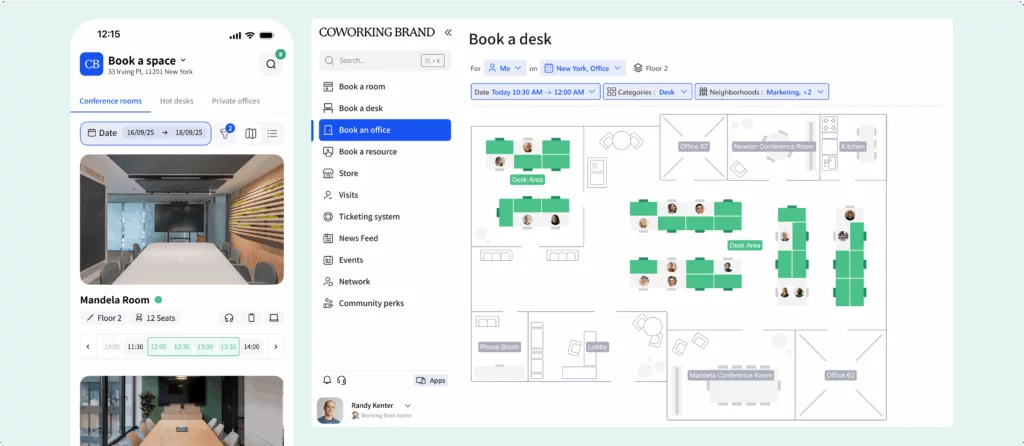
Many coworking spaces also offer extras, like printing services, secure lockers, mail handling, or access to member-only events. These little perks can really add value, so be sure to include them in the agreement, especially if they’re included in some plans but not others.
2. Explain membership terms and payments
When someone joins your coworking space, it’s important they know exactly how their membership works: how long it lasts, how it renews, and how payments are handled. This helps avoid misunderstandings and keeps things running smoothly for both you and your members.
Is the membership a month-to-month setup? A 3-month or 12-month plan? Let members know when their membership starts and if it renews automatically. Most coworking spaces use rolling monthly memberships, but if yours works differently, make that clear upfront.
Next, talk about how payments are made. In most cases, members are automatically billed each month. Let them know when to expect invoices (usually on the 1st of the month) and which payment methods are accepted (credit card, bank transfer, or something else). You might also want to mention that payments are processed automatically through your system, so there’s no need to manually pay each time. It’s also a good idea to include a note about late fees. For example, if someone misses a payment, there might be a 2-day grace period followed by a $50 late fee for each week the payment is overdue.
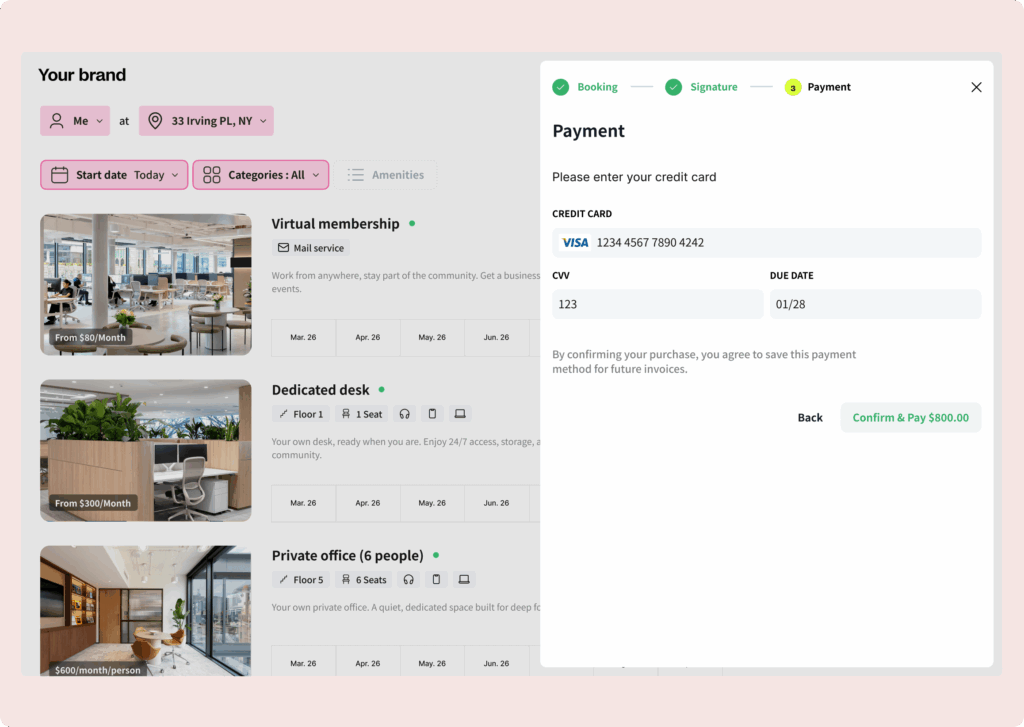
Then, give a brief explanation of how plan changes work. Can members upgrade or downgrade their plan at any time? Do they need to give notice? Explain how membership can be cancelled, so there are no surprises.
Speaking of, you should mention that your space has the right to end someone’s membership at any time, especially if there are serious issues like unpaid bills, breaking the rules, or behavior that affects others in the space. Being upfront about this helps set clear expectations and protects your team and community.
3. How to use the coworking space (with some ground rules)
To keep your space welcoming and enjoyable for everyone, make sure to set a few ground rules. Your coworking space agreement is the perfect place to do that!
For example, you can remind members that:
- Shared spaces must be treated with care and left clean
- Meeting rooms need to be booked in advance with Archie
- Guests are allowed (if you allow them), but members should register the visitors via Archie and be responsible for their behavior
- Door access is private; sharing access codes or keys is not allowed and may lead to membership termination
- Everyone should respect each other’s privacy and keep any confidential information they see or hear in the space to themselves
Here’s more on coworking rules and regulations if you’re looking for more examples.
4. Liability, damages, and conflict resolution
Accidents happen, and that’s okay, but it’s important that your coworking space agreement clearly explains who’s responsible for what.
Let members know that they are fully responsible for any damage they cause to the space, equipment, or furniture, whether it’s accidental or due to neglect. This also includes any damage caused by guests they bring into the space. If someone spills coffee on a chair, breaks a monitor, or causes other issues, they’re expected to cover the cost of repairs or replacements.
It’s also a good idea to explain that your coworking space is not responsible for lost, stolen, or damaged personal items. Encourage members to keep track of their belongings and avoid leaving valuables unattended. While your team will do its best to maintain a safe environment, members should understand that they use the space at their own risk.
Then, even in the friendliest coworking communities, misunderstandings can happen, whether it’s over noise, shared resources, or something else. That’s why it’s a good idea to include a simple process for resolving disputes in your coworking space agreement.
Let members know that if there’s a problem, either between members or between a member and your team, it should be brought to management first. Most issues can be sorted out quickly with a calm conversation and a bit of understanding. You might also include a note that serious or ongoing concerns will be looked into formally, and that your team will do its best to find a fair solution for everyone involved.
Coworking space agreement template
We’ve put together a customizable coworking space agreement template that includes all the sections above. You can copy it, edit it for your space, and send it digitally to new members (preferably through Archie!).
Coworking Space Membership Agreement
This Membership Agreement (the “Agreement”) is between [COWORKING SPACE] (“the Company”) and the undersigned Member (“You”). By signing this Agreement, you acknowledge and accept the terms outlined below. This Agreement is not a lease, it provides a prepaid license to use shared workspaces and amenities as described. [COWORKING SPACE] reserves the right to update this Agreement at any time without notice.
1. Services
[COWORKING SPACE] provides access to coworking space based on your chosen membership plan. Services may include:
- Shared workspace and lounge access
- High-speed internet
- Use of meeting rooms and event space (based on availability and plan)
- Access to office equipment, kitchen, and common areas
- Additional offerings such as mail handling and reception (if included in your plan)
All services are subject to availability and may change over time.
2. Payments
You’ll be automatically invoiced based on your selected plan. Payments are due on the 1st of each month or as stated in your initial invoice. Late payments will result in a $50 weekly fee after a 2-day grace period, and services may be paused until payment is received.
3. Damages & Responsibility
Members are responsible for any damage caused by themselves or their guests. [COWORKING SPACE] may charge the member’s payment method to recover the cost of damage at any time without prior notice.
4. Guests
You’re welcome to bring guests, but you are fully responsible for them. That includes any damage, theft, or injury they may cause while in the space.
5. Liability Waiver
By signing this agreement, you agree to waive [COWORKING SPACE], its staff, and affiliates from any responsibility for personal injury or property loss, even if caused by negligence.
6. Security & Access
Access is private and assigned to each member. Sharing access codes, keys, or cards is not allowed and may lead to immediate termination of your membership. Doors are locked 24/7. A $100 fee or cost of damages (whichever is greater) will be charged for leaving doors open or unlocked or for leaving keys in doors.
7. Coworking Space Rules
We expect all members to respect the space and others in it. Please:
- Keep noise to a minimum
- Avoid disruptive behavior
- Take care of shared equipment and furniture
- Don’t install or alter anything without permission
This is a shared environment—be mindful of what you say and do.
8. No Tenancy or Residency
Membership does not create a landlord-tenant relationship. You are not renting the space as a residence, and you may not use it as one.
9. Confidentiality
While using the space, you may come across sensitive information from other members or the company. Please respect their privacy and don’t share what isn’t yours to share.
10. Cancellation & Termination
You can cancel your membership by giving at least 30 days’ written notice before the next renewal. If no notice is given, your membership continues into the next month. The company can terminate your membership at any time, without notice, for non-payment or breaking the rules.
11. Abandoned Property
Anything you leave behind after your membership ends may be considered abandoned. [COWORKING SPACE] can move, store, or dispose of it at your cost.
By signing below, you agree to the terms of this Membership Agreement.
Member Name: ___________________________
Signature: ______________________________
Date: ___________________________
[COMPANY NAME] Representative: ___________________________
Signature: ______________________________
Date: ___________________________
How Archie helps with coworking space agreements
Getting new members signed up and sorting out all the paperwork can be a bit of a pain, but coworking management tools like Archie make signing and onboarding new members much easier.
Here’s how it works: when someone signs up on your coworking space website, they can choose the plan that fits them best. Based on what they pick, Archie automatically sends them the right coworking agreement to sign online. No paperwork, no printing, just a few clicks and it’s done.

Right after they sign and pay, Archie kicks off the rest. It creates their invoice, send a welcome email, gives them access to the space, and assigns things like Wi-Fi, printing credits, lockers, or even a parking spot, depending on their plan. Your team doesn’t need to do a thing as it all happens automatically.
If you ever update your terms or make changes to your membership plans, it’s really easy to upload a new version of your agreement in Archie. That way, new members will always see the latest version, and you won’t have to worry about anyone getting old or outdated info. Plus, Archie automatically saves signed agreements in each member’s profile, so you can quickly find them anytime you need.
In short, here’s how Archie helps with coworking space agreements:
- Members can register, choose a plan online, and sign the coworking space agreement digitally
- Payments and invoice creation happen automatically
- Archie sends a welcome email and assigns Wi-Fi, lockers, printing credits, or parking based on their plan
- Members can update their own billing info or privacy settings
- Members can network with others, get in touch with community managers, book desks or meeting rooms, everything from the web or mobile app
And that’s not even everything Archie can do for you and your members. See it for yourself.

Berenika Teter
Archie's Content Manager, fueled by filter coffee and a love for remote work. When she’s not writing about coworking spaces and hybrid workplaces, you can probably find her exploring one.
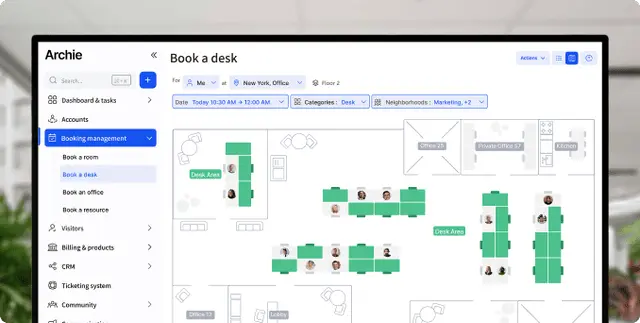


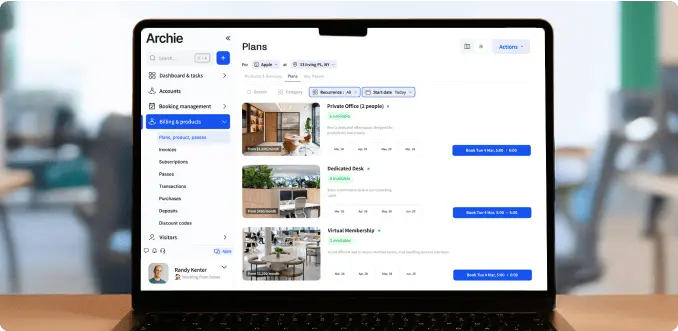

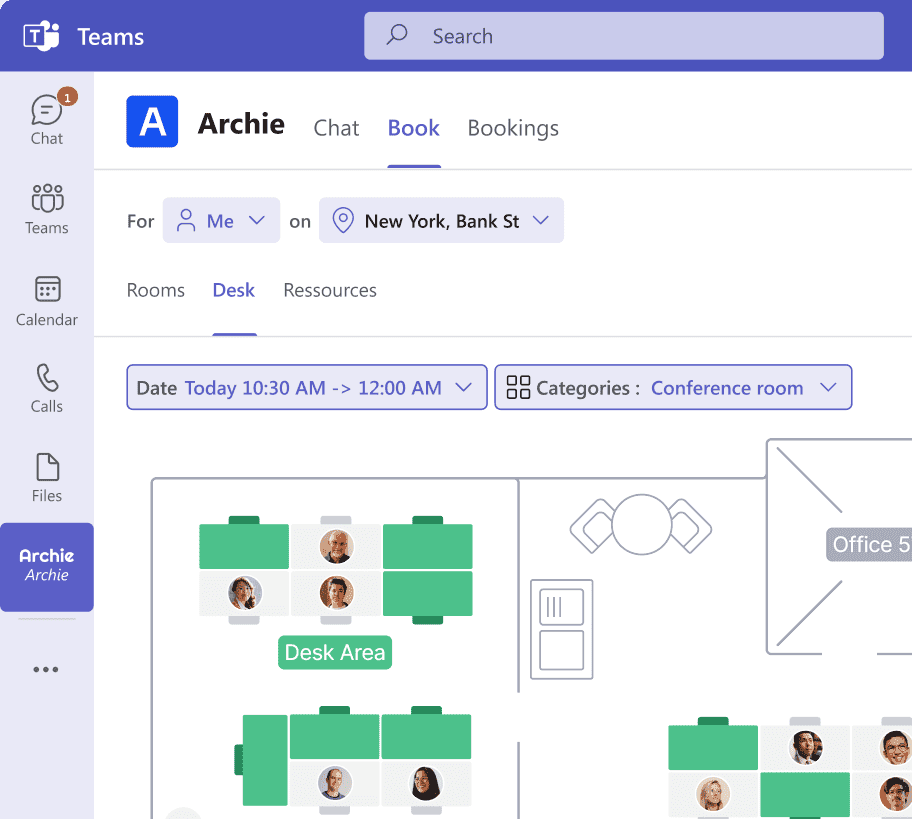
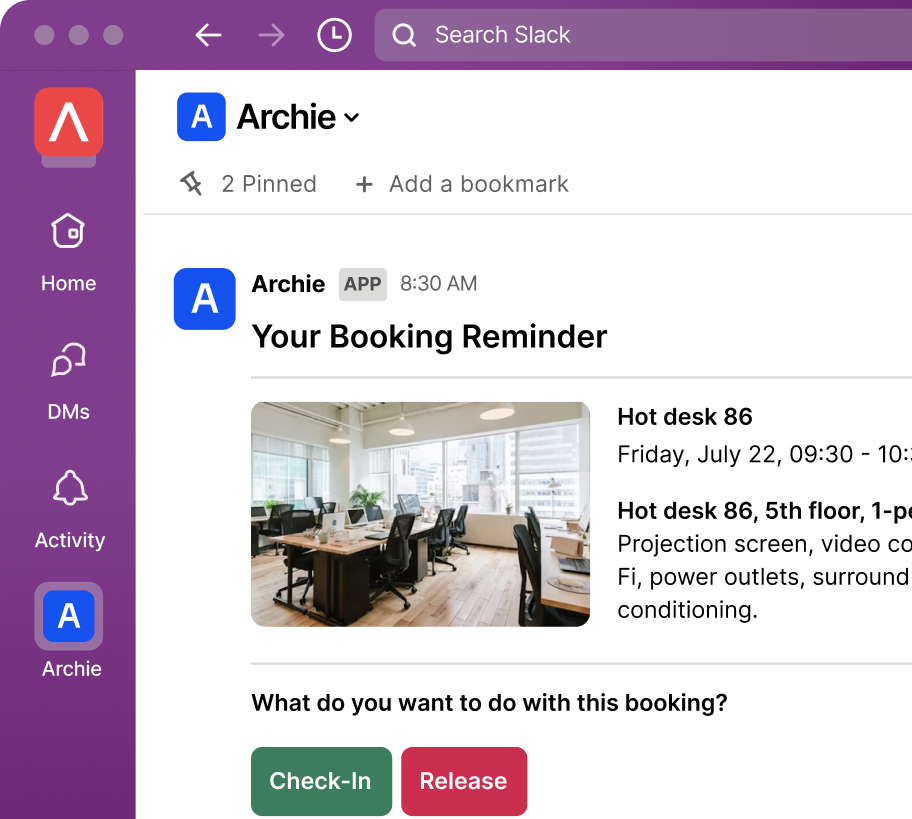


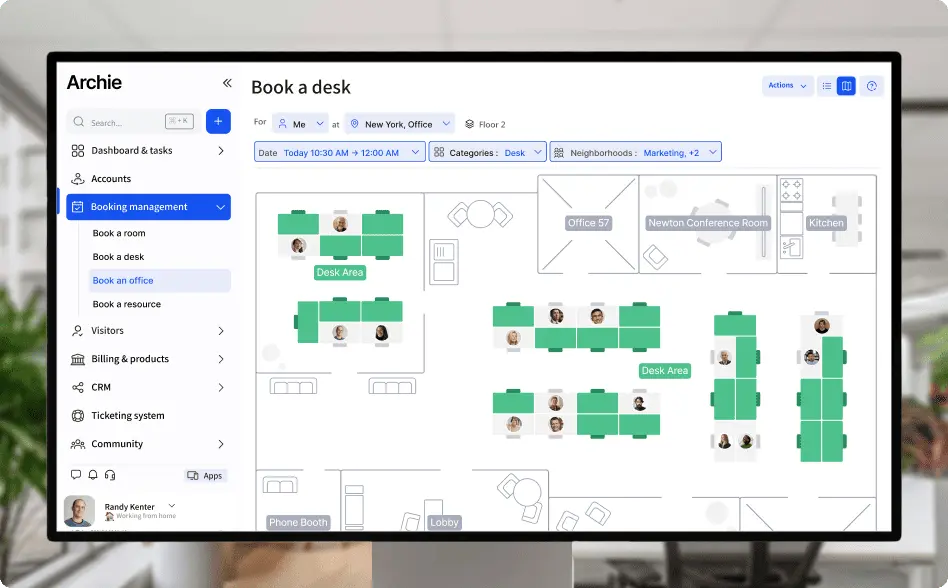
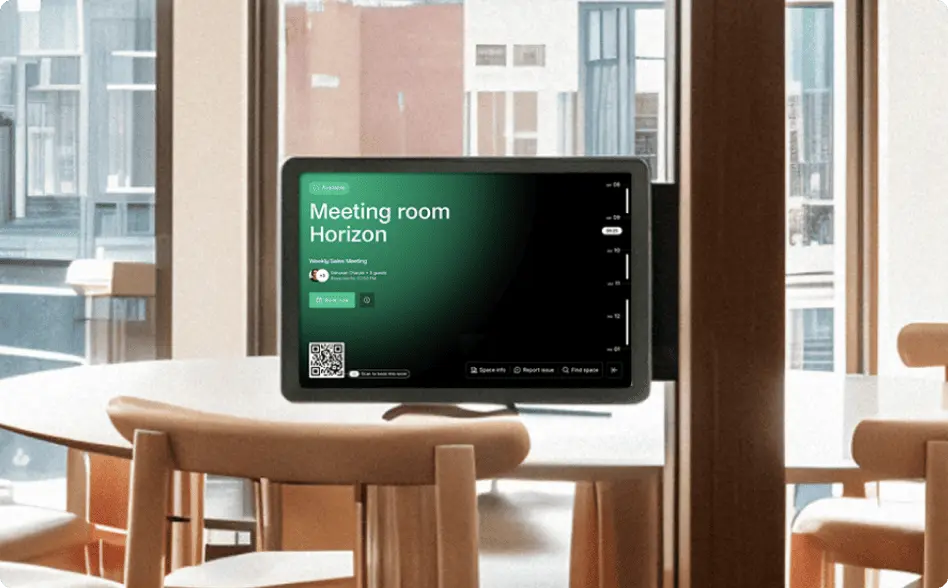
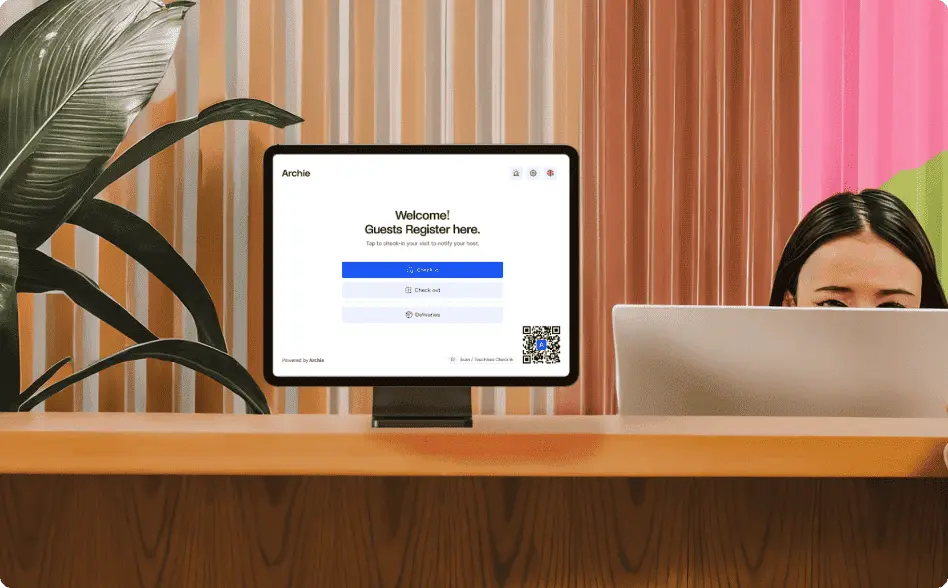



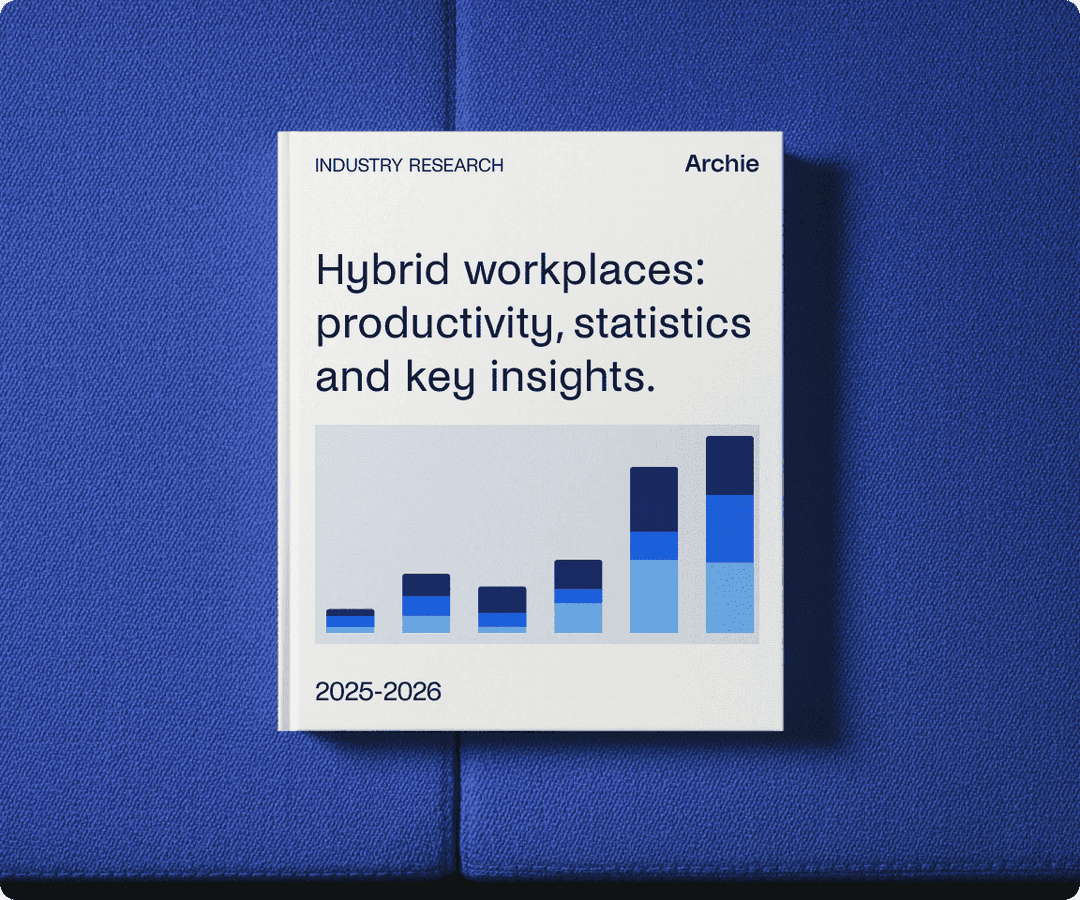

![How to Create a Coworking Space Agreement [+ Template] A colorful coworking space with long wooden desks, white chairs, potted plants, and cozy wall nooks for focused work.](https://archieapp.co/blog/wp-content/uploads/2024/01/cowooork-scaled.jpeg)
![38 Top Coworking Conferences and Events of 2026 [Confirmed] Top coworking conferences - cover image.](https://archieapp.co/blog/wp-content/uploads/2023/10/coworking-400x400.jpeg)

![10+ Best Coworking Space Software: In-Depth Review [2026] Hand holding a smartphone showing the Archie app interface with desk and room booking options.](https://archieapp.co/blog/wp-content/uploads/2025/06/Best-coworking-space-software-cover-image-400x400.jpg)
![The Latest Coworking Statistics & Industry Trends [2026] A cozy coworking space with wooden walls, warm lighting, and a large map of South America.](https://archieapp.co/blog/wp-content/uploads/2025/08/Latest-coworking-statistics-cover-image-400x400.jpg)